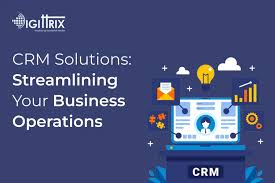How a Contact Management System Can Streamline Your Small Business Operations
A Contact Management System (CMS) can revolutionize small business operations by improving efficiency, organization, and customer relationships. Learn how CMS can streamline your workflow today.
In today's fast-paced business environment, managing customer relationships efficiently is crucial for the success of any small business. A Contact Management System (CMS) provides a centralized platform to store, organize, and manage customer data, ensuring seamless communication and improved productivity. This article explores how a CMS can streamline your small business operations and enhance customer interactions.
What is a Contact Management System?
A Contact Management System is a software tool designed to store and manage customer information, including names, phone numbers, email addresses, and interaction history. Unlike spreadsheets or traditional Rolodexes, a CMS offers automation, integration, and analytics to optimize customer relationships and sales processes.
Benefits of a Contact Management System for Small Businesses
1. Enhanced Organization and Accessibility
A CMS eliminates the need for scattered spreadsheets and manual record-keeping. It provides a centralized database where all customer data is stored securely and can be accessed easily by authorized team members from any device.
2. Improved Communication and Collaboration
With shared access to customer data, team members can seamlessly coordinate follow-ups, track past interactions, and ensure consistent communication. This fosters a more personalized customer experience, increasing satisfaction and retention rates.
3. Time-Saving Automation
A CMS automates repetitive tasks such as:
- Sending follow-up emails
- Scheduling appointments
- Tracking communication history By reducing manual work, businesses can focus on customer engagement and sales growth.
4. Better Sales and Lead Management
A CMS helps in tracking leads from initial contact to conversion. It provides insights into:
- Lead status and progress
- Follow-up schedules
- Sales performance metrics This allows businesses to prioritize high-potential leads and optimize sales efforts.
5. Data-Driven Decision Making
Many CMS solutions offer analytics and reporting tools to track customer behavior, sales trends, and engagement rates. These insights help businesses refine their strategies and make informed decisions to improve growth and profitability.
6. Integration with Other Business Tools
Modern CMS platforms integrate with CRM software, email marketing tools, and e-commerce platforms, ensuring seamless workflow management and reducing redundancy in operations.
How to Choose the Right Contact Management System for Your Business
When selecting a CMS, consider the following factors:
1. Ease of Use
A user-friendly interface ensures quick adoption by employees and minimizes training time.
2. Scalability
Choose a system that can grow with your business needs, supporting additional contacts and advanced features.
3. Integration Capabilities
Ensure the CMS integrates with existing tools such as email services, accounting software, and CRM platforms.
4. Customization Options
Look for a CMS that allows you to customize fields, reports, and workflows to suit your unique business requirements.
5. Security and Compliance
Customer data security is critical. Ensure the CMS complies with data protection regulations and offers encryption and access control features.
Top Contact Management Systems for Small Businesses
Here are some popular CMS solutions tailored for small businesses:
- HubSpot CRM – Free and user-friendly with automation capabilities
- Zoho CRM – Offers advanced analytics and multi-channel communication
- Salesforce Essentials – Scalable and feature-rich for growing businesses
- Pipedrive – Best for sales tracking and pipeline management
- Nimble – Ideal for social media and contact integration
A Contact Management System is a powerful tool that can streamline your small business operations by enhancing organization, communication, and decision-making. Investing in the right CMS not only improves efficiency but also strengthens customer relationships, ultimately driving growth and success. By leveraging automation and data analytics, small businesses can stay ahead in a competitive marketplace.
FAQ
1. What is the difference between a CMS and a CRM?
A CMS primarily focuses on storing and organizing customer contact information, whereas a Customer Relationship Management (CRM) system offers broader functionality, including sales tracking, marketing automation, and advanced analytics.
2. Is a CMS suitable for small businesses?
Yes, a CMS is particularly beneficial for small businesses as it reduces manual workload, enhances efficiency, and improves customer interactions without the complexity of full-fledged CRM software.
3. How much does a Contact Management System cost?
CMS pricing varies based on features and providers. Some solutions, like HubSpot CRM, offer free versions, while premium plans can range from $10 to $100 per user per month.
4. Can a CMS integrate with email marketing platforms?
Yes, most modern CMS solutions integrate with email marketing tools such as Mailchimp, Constant Contact, and ActiveCampaign to streamline customer communication.
5. What security measures should a CMS have?
A good CMS should include data encryption, user authentication, access controls, and compliance with GDPR or other relevant data protection laws to safeguard customer information.
By implementing a Contact Management System, small businesses can achieve better efficiency, stronger customer relationships, and increased revenue, making it an invaluable tool for success in today’s digital world.
Posting Komentar untuk "How a Contact Management System Can Streamline Your Small Business Operations"